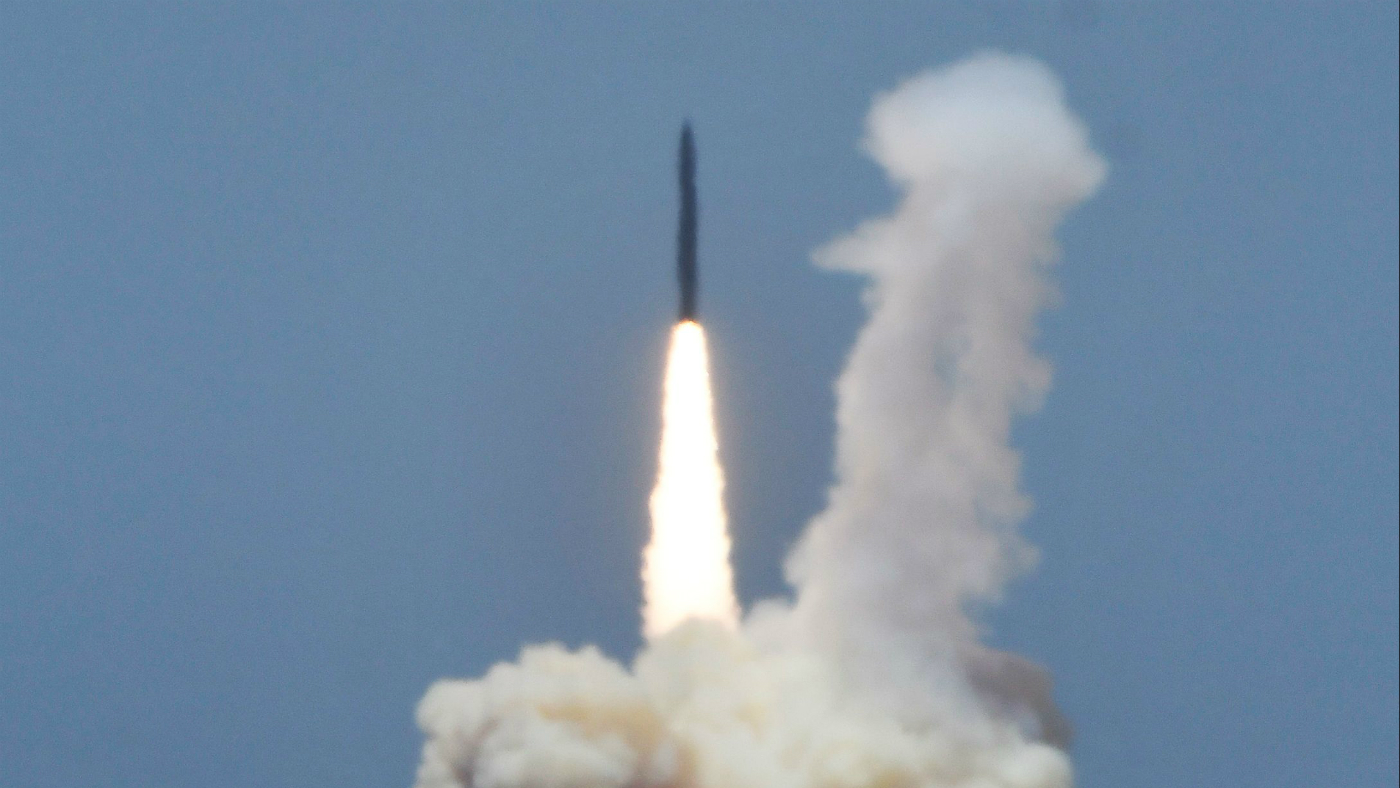US successfully destroys mock warhead in anti-missile test
Test is first attempt to shoot down a simulated intercontinental ballistic missile

A free daily email with the biggest news stories of the day – and the best features from TheWeek.com
You are now subscribed
Your newsletter sign-up was successful
The US has successfully tested an anti-missile defence system as fears grow internationally that North Korea is close to building an intercontinental nuclear missile.
The Pentagon successfully shot down a simulated intercontinental ballistic missile on Tuesday using its own interceptor missile.
The mock warhead was launched from the Ronald Reagan Ballistic Missile Defence Test Site on the island of Kwajalein Atoll in the Pacific. It was destroyed by another missile fired from Vandenberg Air Force Base in California.
The Week
Escape your echo chamber. Get the facts behind the news, plus analysis from multiple perspectives.

Sign up for The Week's Free Newsletters
From our morning news briefing to a weekly Good News Newsletter, get the best of The Week delivered directly to your inbox.
From our morning news briefing to a weekly Good News Newsletter, get the best of The Week delivered directly to your inbox.
The concept of an anti-missile missile has been described as analogous to trying to hit a bullet with another bullet at high speed.
The US system has been in development for over 15 years but Tuesday was the first attempt to target an intercontinental ballistic missile.
A statement from the Missile Defence Agency said the interceptor "destroyed the target in a direct collision".
The interceptor missile carried an upgraded "kill vehicle", says CNN, which carries no explosives – neither in test nor operation – but obliterates the missile it targets solely by colliding with it.
A free daily email with the biggest news stories of the day – and the best features from TheWeek.com
The test was not entirely realistic because it's thought that in a real attack, the US would fire several interceptors at once. However, the US might also be facing several missiles at the same time.
The system is not the same as the one based on the South Korean mainland that the US announced was operational earlier this month. That system – THAAD – is designed to take down smaller missiles with a much shorter range that would not threaten the US mainland.
The timing of the test has prompted the assumption that the system is designed to tackle the North Korean threat but the Pentagon insists it's being developed to tackle any threatening intercontinental ballistic missile, including the possibility of a strike by Iran.
US President Donald Trump tweeted on Monday that North Korea had shown "great disrespect" for China with its latest missile test of a short-range ballistic missile that splashed down in the Sea of Japan after a flight of 248 miles.
US national intelligence director Dan Coats warned Congress last week that "North Korea is an increasingly grave national security threat to the United States because of its growing missile and nuclear capabilities combined with the aggressive approach of its leader Kim Jong Un.
"Kim is attempting to prove that he has the capability to strike the US mainland with a nuclear weapon."
-
 The ‘ravenous’ demand for Cornish minerals
The ‘ravenous’ demand for Cornish mineralsUnder the Radar Growing need for critical minerals to power tech has intensified ‘appetite’ for lithium, which could be a ‘huge boon’ for local economy
-
 Why are election experts taking Trump’s midterm threats seriously?
Why are election experts taking Trump’s midterm threats seriously?IN THE SPOTLIGHT As the president muses about polling place deployments and a centralized electoral system aimed at one-party control, lawmakers are taking this administration at its word
-
 ‘Restaurateurs have become millionaires’
‘Restaurateurs have become millionaires’Instant Opinion Opinion, comment and editorials of the day
-
 Epstein files topple law CEO, roil UK government
Epstein files topple law CEO, roil UK governmentSpeed Read Peter Mandelson, Britain’s former ambassador to the US, is caught up in the scandal
-
 Iran and US prepare to meet after skirmishes
Iran and US prepare to meet after skirmishesSpeed Read The incident comes amid heightened tensions in the Middle East
-
 Israel retrieves final hostage’s body from Gaza
Israel retrieves final hostage’s body from GazaSpeed Read The 24-year-old police officer was killed during the initial Hamas attack
-
 China’s Xi targets top general in growing purge
China’s Xi targets top general in growing purgeSpeed Read Zhang Youxia is being investigated over ‘grave violations’ of the law
-
 Panama and Canada are negotiating over a crucial copper mine
Panama and Canada are negotiating over a crucial copper mineIn the Spotlight Panama is set to make a final decision on the mine this summer
-
 Why Greenland’s natural resources are nearly impossible to mine
Why Greenland’s natural resources are nearly impossible to mineThe Explainer The country’s natural landscape makes the task extremely difficult
-
 Iran cuts internet as protests escalate
Iran cuts internet as protests escalateSpeed Reada Government buildings across the country have been set on fire
-
 US nabs ‘shadow’ tanker claimed by Russia
US nabs ‘shadow’ tanker claimed by RussiaSpeed Read The ship was one of two vessels seized by the US military